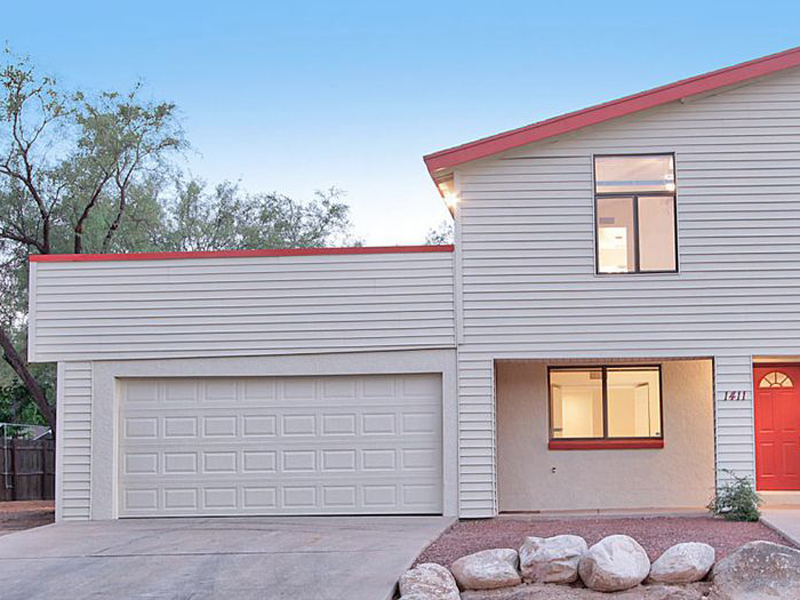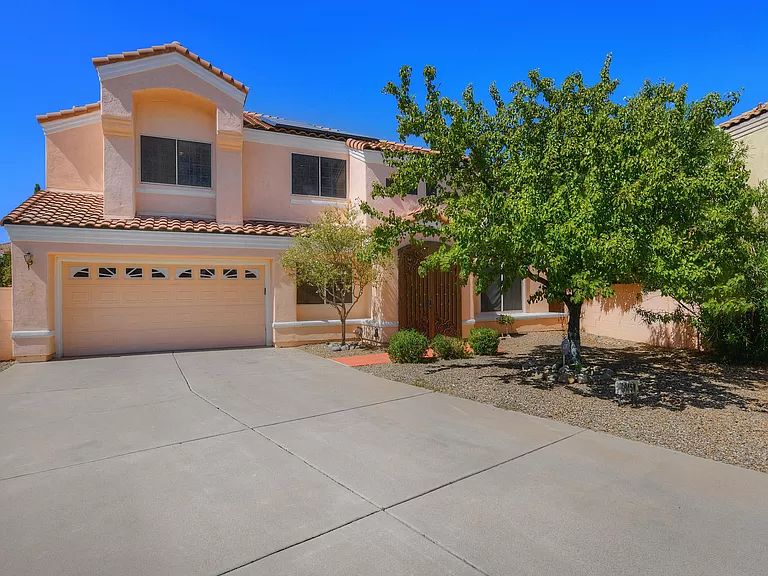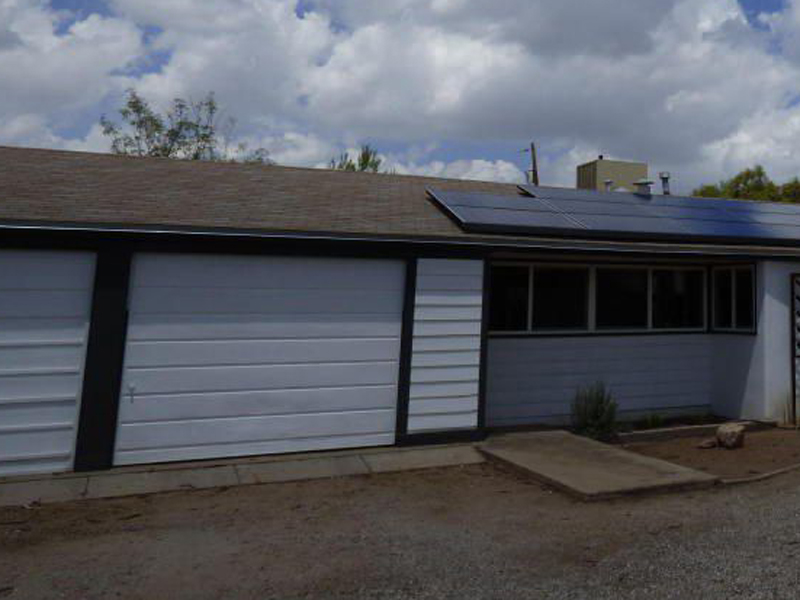Is Your Garage Door Stuck? Right here's What to Do Initial
When your garage door will not open, begin with these important safety checks prior to attempting any type of repair work. Initially, make certain no one is standing near the door which lorries are free from the opening. Search for apparent indications of damage like broken panels, curved tracks, or hanging wires. If you see a snapped spring or badly damaged parts, quit instantly and call a specialist—-- these repair services need specialized tools and competence to handle securely.

Check These 6 Points Prior To Calling an Expert
Prior to presuming you require expensive repair work, run through this fast diagnostic checklist that solves most garage door problems:
-
Source of power: Confirm the opener is plugged in and the outlet is working
-
Remote batteries: Change dead batteries in your remote control
-
Manual lock: Inspect if someone mistakenly engaged the hands-on lock
-
Blockages: Seek particles blocking the door's path or sensors
-
Emergency release: Ensure the red emergency cable hasn't been pulled
-
Breaker: Validate the garage circuit hasn't stumbled
These easy checks solve around 70% of garage door problems without needing professional treatment.
10 Usual Reasons Your Garage Door Won't Open
Comprehending why your garage door opener isn't functioning assists you pick the appropriate solution. Here are one of the most regular causes home owners experience:
Dead remote batteries represent the simplest repair—-- when batteries pass away, the remote can't send out signals to the opener. Power outages or stumbled breakers reduced electricity to the electric motor. Broken springtimes stop the door from raising appropriately and require instant expert attention. Sensor imbalance reasons safety and security systems to block door procedure. Track obstructions quit rollers from moving efficiently. Electric motor overload triggers automated shutoffs when the opener finds resistance. Limitation switch problems confuse the opener concerning door position. Cord damage disrupts the training device. Weather-related issues affect door motion throughout severe temperatures. Part wear from age gradually decreases system efficiency.
Problem # 1: Dead Remote Batteries
When your wall switch functions however your remote does not, dead batteries are normally the culprit. The majority of garage door remotes make use of either 3-volt lithium or 12-volt alkaline batteries. Eliminate the back cover of your remote and inspect the battery kind. Replace with fresh batteries and examine the remote. If it still doesn't function, you might require to reprogram it to your opener. Consult your opener's guidebook for details reprogramming instructions, as the procedure varies by maker.
Problem # 2: Power Supply Issues
Garage door power problems commonly stem from loose links or stumbled circuits. Check that the opener is securely connected into its outlet—-- vibration can loosen up links gradually. Check the outlet with one more gadget to verify it's working. Examine your home's breaker box for tripped circuits, particularly if you have actually experienced storms or power changes. GFCI electrical outlets might have tripped and require resetting. If the opener has power but will not respond, the problem most likely lies elsewhere in the system.
Trouble # 3: Broken or Damaged Springs
Busted garage door springs are amongst the most harmful parts to take care of. If you listen to a loud bang from your garage or notice the door really feels incredibly heavy when attempting to raise manually, a spring has actually likely snapped. Torsion springtimes run horizontally over the door, while expansion springtimes sit on either side. Never ever try springtime repair work on your own—-- these parts save tremendous stress that can trigger severe injury or fatality. Specialist substitute commonly costs $150-$300 however ensures your safety and security.
Issue # 4: Blocked Safety Sensors
Modern garage doors include security sensors that prevent closure when items are detected. These sensors can quit the door from opening up if they're filthy, misaligned, or blocked by debris. Tidy sensing unit lenses with a soft fabric and ensure nothing obstructs the unseen beam between them. Examine that sensing units are effectively lined up—-- many have sign lights that show connection standing. Sensor problems frequently settle with simple cleansing and adjustment.
Trouble # 5: Track Obstructions or Damage
Garage door tracks guide rollers as the door moves up and down. Dust, debris, old oil, or small objects can jam the system. Check tracks aesthetically and eliminate any type of blockages with a brush or fabric. Try to find damages, flexes, or bending that can impede smooth operation. Small track adjustments are possible for convenient house owners, but significant damage calls for professional fixing to stop further problems or safety and security threats.
Problem # 6: Garage Door Opener Electric Motor Issues
When the garage door motor runs however the door doesn't move, a number of concerns could be liable. The motor might be overwhelmed and shutting down as a precaution. Equipment wear, particularly in older systems, can prevent proper operation. Chain or belt drive troubles impact power transmission. If you hear unusual grinding, clicking, or humming noises, stop utilizing the opener promptly. Electric motor repair work often cost more than replacement, especially for systems over 10 years old.
Step-by-Step DIY Troubleshooting Overview
Follow this systematic strategy to garage door fixing while focusing on safety and security throughout the process:
Action 1: Check the wall switch first. If it functions yet the remote doesn't, concentrate on remote problems. If neither works, inspect power supply.
Action 2: Take a look at the manual release cable. If it's been drawn, the opener is disengaged from the door. Press the cart back to reconnect.
Action 3: Manually check the door by disengaging the opener and attempting to raise the door by hand. It needs to relocate smoothly and stay in place when half-open.
Tip 4: Examine noticeable parts for damages, paying unique attention to springs, cords, and tracks.
Tip 5: Examine all safety attributes consisting of sensors, limitation switches, and auto-reverse features.
Action 6: Examination various controls (remote, wall surface switch, keypad) to separate the trouble source.
Always put on shatterproof glass and work handwear covers when doing assessments, and never ever attempt repairs on springs or high-tension components.
When to Call a Specialist vs. DIY Solutions

Understanding when to call a garage door professional versus trying do it yourself repair work safeguards both your security and your budget. Handle these problems yourself: dead remote batteries, power supply troubles, small track cleaning, sensing unit cleansing and alignment, and basic lubrication.
Never try these repairs on your own: springtime substitute or adjustment, cable repair signs of a broken garage door spring services, significant track adjustment, electrical wiring issues, opener motor replacement, or any repair service including high-tension parts. Professional technicians have specialized tools, training, and insurance to manage hazardous repairs safely.
Think about repair service costs versus replacement costs, specifically for doors over 15 years old. Modern garage doors offer much better security functions, energy efficiency, and dependability than older versions.
Emergency Garage Door Solutions
When you're stuck with a garage door that won't open up and need instant access, follow these emergency procedures:
Guidebook Procedure: Pull the red emergency release cord to disengage the opener. This permits hand-operated operation yet requires appropriate strategy to avoid injury. Lift the door slowly and equally, making use of leg muscular tissues as opposed to your back. A lot of residential doors weigh 100-150 extra pounds, making them workable for many grownups.
Momentary Repairs: If the door opens up by hand but will not stay up, prop it open with sawhorses or clamps—-- never use your body or vehicles as assistances. For doors that will not close completely, guarantee the opening is protected if you must leave.
Emergency Service: Several garage door business offer 24/7 emergency situation solution for scenarios entailing safety problems, caught automobiles, or complete system failures. While more costly than normal solution calls, emergency repair work offer prompt remedies when needed most.
Safety Warning: What NOT to Do
Garage door safety and security needs recognizing unsafe repair services that must never be tried by house owners:
Never attempt to repair springs—-- they store enough energy to cause deadly injuries when they snap or are poorly dealt with. Don't require a stuck door—-- this can harm the opener, tracks, or door panels, producing much more expensive issues. Avoid bypassing safety and security functions—-- sensing units and auto-reverse devices prevent severe injuries and building damages.
Don't disregard weird noises—-- grinding, scuffing, or banging sounds indicate problems that aggravate in time. Never ever utilize the door if cables are frayed or damaged—-- the door could drop unexpectedly. Don't try electric repairs unless you're a qualified electrical expert—-- garage door openers use both 120V family existing and low-voltage control circuits.

Preventive Upkeep to Prevent Future Troubles
Routine garage door upkeep stops most usual issues and extends system life expectancy significantly:
Monthly Jobs: Aesthetic inspection of all elements, evaluating auto-reverse security functions, examining and tightening hardware, and cleaning tracks and sensing units.
Quarterly Tasks: Lubricating all moving get rid of appropriate garage door lubricant, testing guidebook operation, and examining weather sealing.
Yearly Jobs: Expert evaluation and tune-up, spring modification if needed, and opener maintenance consisting of belt or chain change.
Seasonal Jobs: Preparing for weather condition extremes, checking insulation, and changing opener settings for temperature level modifications.
Constant maintenance costs much less than emergency repairs and ensures reliable procedure year-round.
Garage Door Will Not Open FAQs
Why will not my garage door open with the remote however collaborates with the wall button?
This generally indicates dead remote batteries, signal disturbance, or the need to reprogram the remote. Examine batteries first, then consult your opener manual for reprogramming instructions.
Can I by hand open my garage door if the power is out?
Yes, pull the red emergency situation launch cord to disengage the opener, then lift the door manually. Be gotten ready for the door's complete weight and lift with correct method to prevent injury.
Exactly how do I know if my garage door spring is damaged?
Indicators consist of a loud bang from the garage, the door feeling incredibly hefty when raising by hand, noticeable spaces in the springtime coils, or the door only opening up a couple of inches prior to stopping.
Is it risk-free to utilize my garage door if it will not open all the way?
No, partial procedure suggests mechanical issues that might get worse unexpectedly. Stop making use of the door and have it inspected by a professional to avoid further damage or injury.
What should I do if my garage door opens up yet won't shut?
Check safety sensors for blockages or imbalance, take a look at the tracks for particles, and evaluate the auto-reverse feature. If these don't solve the trouble, get in touch with an expert.
Just how much does it cost to repair a garage door that will not open?
Prices vary widely depending on the issue: battery replacement ($5-$10), specialist medical diagnosis ($50-$100), springtime replacement ($150-$300), or opener substitute ($200-$500).
Can weather affect my garage door's capacity to open?
Yes, extreme cold can thicken lubes and influence metal elements, while heat can cause growth issues. Many problems solve as temperatures normalize, however consistent issues may need expert focus.
Why does my garage door open up a couple of inches then stop?
This usually shows damaged springs, restriction switch problems, or track blockages. The opener's safety and security functions quit procedure when resistance is identified, preventing damages to the electric motor or door.
Get Specialist Aid for Complicated Issues
When do it yourself repairing does not settle your garage door issues, specialist service technicians supply the know-how and tools required for risk-free, long-term fixings. Qualified experts identify concerns properly, utilize manufacturer-approved parts, and give warranties on their job.
Expert solutions consist of: comprehensive system examinations, spring and cable replacement, opener repair and substitute, track placement and replacement, electrical troubleshooting, and emergency situation solution phone calls.
What to anticipate: ahead of time prices, certified and insured technicians, same-day service for many repair services, and follow-up maintenance recommendations.
The majority of garage door business provide complimentary estimates for significant fixings and can give prompt remedies for immediate troubles affecting home safety and security or lorry gain access to.
Obtaining Your Garage Door Working Again
A garage door that won't open up doesn't have to wreck your day or break your budget plan. Start with easy troubleshooting actions like examining power, replacing batteries, and analyzing for evident obstructions. Lots of issues have fast DIY remedies that recover regular procedure within mins.
However, recognize when expert aid is essential—-- specifically for spring-related concerns, electrical issues, or complex mechanical failings. Trying hazardous repair work yourself takes the chance of major injury and often develops much more costly troubles.
Regular upkeep prevents most garage door problems and makes certain dependable procedure for many years to come. When troubles do happen, resolve them promptly to avoid more expensive repair work and maintain your home's safety and security and convenience. Whether you require an easy battery replacement or full system overhaul, options exist to get your garage door functioning efficiently once more.